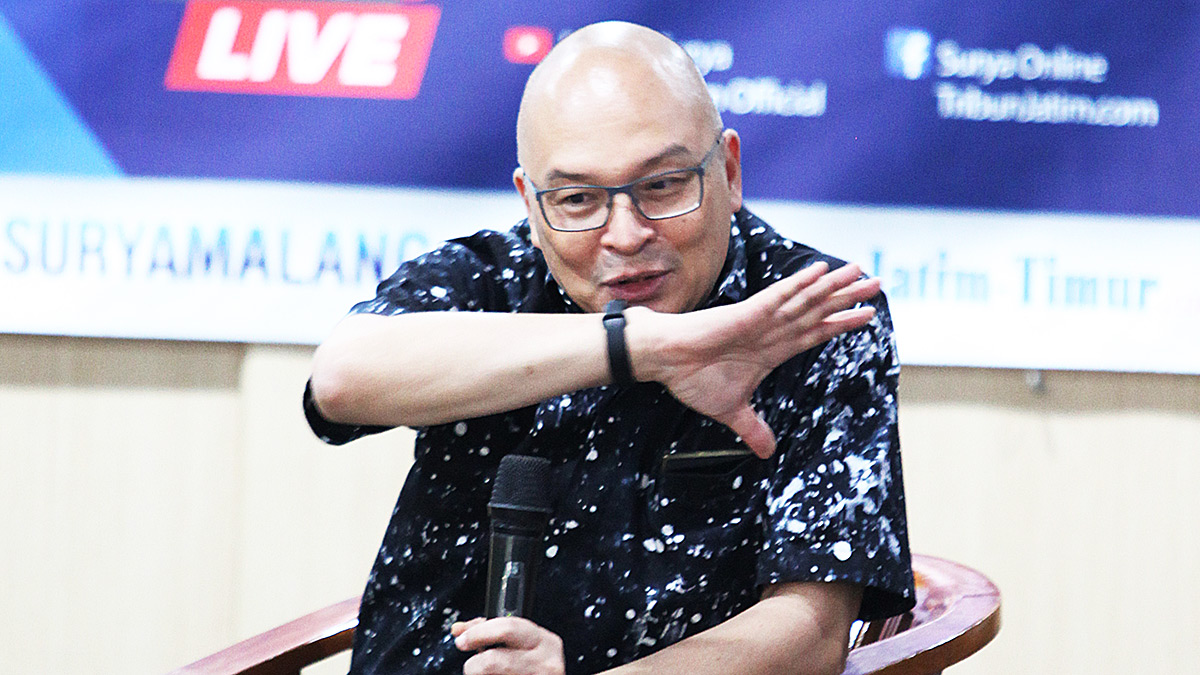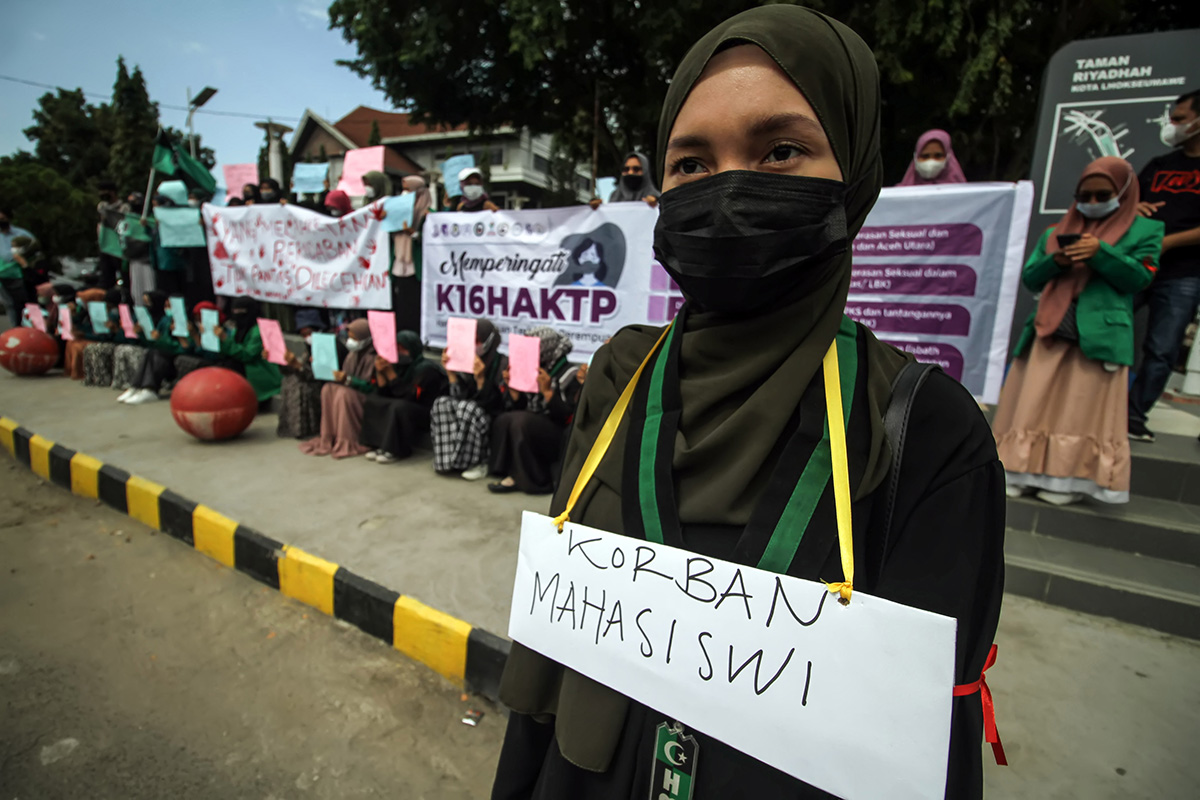Dealing with Increasing Sexual Violence on Campuses
The Sexual Violence Prevention and Handling Task Force often encounters obstacles when dealing with sexual violence cases on campus. Victims feel they do not receive justice.
Ahmad Faiz
November 25, 2024

MEMBERS of the Sexual Violence Prevention and Handling (PPKS) Task Force at the University of Indonesia (UI) gathered for a brief meeting at the end of last March. They were overwhelmed with disappointment toward the university’s rectorate, located in Depok, West Java. On April 1, 2024, all 13 members of the PPKS Task Force signed a letter of resignation. “This is our form of protest against the lack of support from the university,” said the Head of the UI PPKS Task Force, Manneke Budiman.
The professor of literature explained that they were also returning the mandate given to them on November 22, 2022, to the UI Rectorate. In fact, they had threatened to resign a month earlier. They had even stopped accepting reports of sexual violence on campus starting March 4, 2024, but still received no response from the Rectorate.
Manneke mentioned that the UI PPKS Task Force faced too many challenges. For instance, from the beginning, the Rectorate did not allocate a special budget. The funds for handling sexual harassment could only be disbursed if the task force submitted proposals for each activity. As a result, they could not respond to reports quickly. Victim recovery also required funding, and some members of the task force had to pay for these costs out of their own pockets. Of the 13 UI PPKS Task Force members, seven were students with no income.
The UI PPKS Task Force had handled 78 reports over 15 months of service. Each report was followed up by forming a small team of three members. Due to the high number of reports, each member often had to manage two or three cases simultaneously. Manneke Budiman stated that their resignation had paralyzed the UI PPKS Task Force’s activities for the time being. “For now, it’s on hold, waiting for new leadership,” he said.
However, Amelita Lusia, the Head of the Public Relations and Public Information Disclosure Bureau at the University of Indonesia, denied Manneke’s statement. She explained that their resignation would not stop the sexual violence prevention programs. “The need for specialized services related to sexual violence victims can still be addressed through the Makara Clinic and the Directorate of Student Affairs," she said.
Deputy Minister of Higher Education, Science, and Technology, Fauzan, expressed regret over the resignation of the UI PPKS Task Force members. He mentioned that state universities like the UI, which have legal entity status, should have the flexibility to allocate their budgets. “But the budget must be managed well to avoid audits from the Supreme Audit Agency,” he said.
The PPKS Task Force is a campus body mandated by the Education, Culture, Research, and Technology Minister Regulation No. 30/2021 on the Prevention and Handling of Sexual Violence in Higher Education Institutions. Its members consist of lecturers, education staff, and student representatives. All state and private universities are required to form a PPKS Task Force no later than one year after the regulation takes effect.
It turns out that not all universities comply with this ministerial regulation. Out of 4,408 universities, only 1,817, or about 41 percent, have established a PPKS Task Force. Meanwhile, PPKS Task Force in universities under the Religious Affairs Ministry have only been formed in 54 universities. This is considered low, representing only about 19 percent of the 964 religious universities. On the other hand, sexual violence remains a significant threat on campuses.

Head of the Sexual Violence Prevention and Handling Task Force at the University of Indonesia, Manneke Budiman, December 21, 2023. TEMPO/Gunawan Wicaksono
The PPKS Task Force not only accommodates reports from victims but is also required to provide assistance and help with psychological recovery. Through the latest regulation, Education, Culture, Research, and Technology Minister Regulation No. 55 2024, the PPKS Task Force now has the authority to report cases of harassment to law enforcement. For universities that have not yet formed a task force, the government facilitates coordination and handling channels through higher education service institutions spread across the country, from Aceh to Papua. There are currently 17 of these institutions.
Both the previous regulation and the Ministerial Regulation No. 55/2024 detail 26 forms of sexual violence. These include catcalling, sexual advances, and sexually charged jokes, as well as deliberately allowing sexual violence to occur. The regulation also emphasizes the requirement of mutual consent between the parties involved for specific actions. Without this consent, any action is considered sexual violence.
Since the enactment of Ministerial Regulation No. 30/2021, as of last June, the PPKS Task Force at 661 universities have assisted 1,133 victims of sexual violence. Of these victims, 94 percent were women. The perpetrators were not only students or the victims’ partners, but also campus officials or lecturers.
Deputy of Higher Education Minister Fauzan claimed that the government does not leave the handling of harassment cases at each university to chance. The Ministry regularly monitors the handling of reports every three months. This monitoring is entrusted to the Ministry of Higher Education’s Legal Bureau and the Character Strengthening Center. The Ministry is currently working to ensure that 100 percent of private universities have a PPKS Task Force. “It clearly takes time because there are thousands of them,” he said.
•••
ON September 2, 2024, Tempo launched the Lapor Tempo (Report to Tempo) platform specifically for cases of sexual violence. The hope is that victims or those who are aware of sexual violence happening on campuses can inform these cases to Tempo’s editorial team. For more than a month, this platform has received 52 reports submitted through the editorial team’s digital form. These reports span across 35 universities, with allegations including catcalling, inappropriate behavior by lecturers, and forced abortion. Some complainants have expressed willingness to be interviewed but requested their identities remain hidden.
There were also complaints about the handling of harassment cases by campus authorities or the PPKS Task Force. Many were dissatisfied with the recommendations made by the task force, which were considered as unfair and lacking a victim-centered perspective. Some victims reported a lack of psychological support from campus authorities, while others expressed difficulty in obtaining updates on their cases from the PPKS Task Force. Based on these signs, some even alleged that the cases of sexual violence were being covered up by campus officials.
One area of focus has been the apology sanctions imposed on perpetrators. Some have criticized these sanctions as too lenient. Nizam, the Director-General of Higher Education for the 2020-2024 period, stated that public apologies aim to provide a deterrent effect on perpetrators. “That is one of the considerations,” he said. Under previous regulations, the public apology was to be published internally within the campus or in the mass media.
Later, the Education Ministry Regulation No. 55/2024 revised this, stating that the written apology should be directed only to the victim and the university. Sri Suning Kusumawardani, the Director of Learning and Student Affairs at the Ministry of Higher Education, Science, and Technology, explained that the removal of the phrase “published internally at the campus or in the mass media” was due to two factors. First, publicizing it could make the victim uncomfortable, and second, because the forms of violence vary, sanctions cannot be generalized.
In practice, the requirement for a public apology no longer has a fixed guideline. The PPKS Task Force has the authority to determine the form of sanctions. “The task force and university leaders can choose and consider the sanctions and whether they need to be published according to the conclusions in handling the case,” said Sri Suning, citing an explanation from the Center for Character Development at the Higher Education Ministry.
Deputy Minister of Higher Education, Fauzan, called for the public to have a positive outlook on the policy. He emphasized that not all cases must end with legal or administrative sanctions against the perpetrator. According to him, there are still ‘local wisdoms’ that can be applied, such as mutual forgiveness. “But if the victim is dissatisfied with how the campus handled the case, they are welcome to report or appeal to the Ministry’s complaint portal,” he added.
However, some universities have issued implementing regulations with different sanctions. For example, the Rector’s Regulation at the Sepuluh Nopember Institute of Technology (ITS) No. 33/2022. Perpetrators who receive light sanctions such as oral or written warnings only need to apologize to the department or campus leadership. There is no requirement for the apology to be made publicly.
One complainant, a member of the ITS PPKS Task Force, shared their story with Lapor Tempo. Tempo contacted them to provide an anonymous statement. They recounted that during a meeting to draft the rector’s regulation on establishing the PPKS Task Force, a representative from the Legal Services Unit argued that a public apology could damage the campus’ image. “Well, in the end, we compromised because the important thing was that the task force existed first. The implementation could be worked out later,” they said.
Tempo tried to confirm this with the former Rector of ITS, Mochamad Ashari. He directed Tempo to ask the Chair of the ITS PPKS Task Force for 2022-2024, Ellya Zulaikha. However, Ellya did not provide a detailed explanation when contacted, saying only that she had a personal opinion but did not want to share it publicly.

Female student activists hold a rally to protest against violence and sexual harassment against women on campus in Lhokseumawe, Aceh, Thursday, December 9, 2021. ANTARA/Rahmad
Head of the ITS Legal Services and Risk Management Unit Tony Hanoraga denied the allegation that the sanction of public apology was kept out to maintain the campus’ image. ITS considered the sanction to be more appropriate as a severe punishment. He claimed that this had been approved by the Academic Senate. "If made public, it could affect the reputation or psychological condition of the violators, especially if they are students,” he said.
Tony Hanoraga, Head of the ITS Legal Services and Risk Management Unit, denied the allegation that there was no requirement for a public apology to protect the campus’ reputation. ITS believes this sanction is more appropriate as a severe punishment. He claimed that this had been approved by the Academic Senate. “If published, it could damage the reputation or psychological condition of the violator, especially if they are a student,” he explained.
Another report came from WJ, an alumnus of Riau Islamic University, who claimed to have been sexually harassed on last February 22, by a lecturer who was also a dean. WJ initially kept the incident to herself out of shame. “I didn’t talk about it, I kept it inside, but I felt depressed,” she said. Besides reporting it to the PPKS Task Force, WJ also filed a complaint with the Pekanbaru City Police. WJ is now fighting her case with the National Police’s Criminal Investigation Department because the Pekanbaru Police had halted the investigation of her case.
Another victim who reported her case to Lapor Tempo is Rihanna—a pseudonym—a student at National Development University (UPN) Veteran in Yogyakarta. The perpetrator, a lecturer and head of a study program named JS, harassed her on January 11, 2023, when she visited his office to inquire about her studies. Rihanna initially kept the traumatic event to herself but later reported it to the UPN Veteran PPKS Task Force eight months later.
The investigation led to a recommendation of five sanctions for the perpetrator, confirmed by the Rector Decree No. 147/UN62/KP/2023. JS was removed as department head, publicly apologized, suspended as a lecturer for two years, ordered to pay compensation to the victim, and required to undergo counseling. The victim was also provided counseling.
However, Rihanna felt that the decision did not fully bring justice. She expressed dissatisfaction because she had never received support or protection from the campus. She also has not received the compensation she was entitled to. As a result, she had to pay for her psychiatric counseling herself, with costs amounting to Rp20 million (around US$1,260).
Ida Susi Dewanti, Head of the UPN Veteran Yogyakarta PPKS Task Force, said that Rihanna’s report had been handled internally. The report and the case resolution recommendations were now in the hands of campus officials. “It is now in the hands of the leadership,” she said. The Rector of UPN Veteran Yogyakarta, Mohamad Irhas Efendi, did not respond to Tempo’s request for confirmation sent to his WhatsApp account until Friday, November 22.
Sexual harassment can also take the form of inappropriate messages. This happened to Kumala—a pseudonym—a student at the State Islamic University (UIN) of Kudus in Central Java. Through a messaging app, a male senior student attempted to lure her to go out late at night and then massage her. The perpetrator also sent other lewd messages. This incident occurred in last August.
Kumala reported the case to the UIN Kudus Center for Gender and Child Studies (PSGA). However, Kumala was disappointed because the resolution of her complaint was unclear. Her older sibling, S, shared that Kumala had also approached a university deputy rector to ask for justice. The rectorate official promised to follow up on the report. “When we followed up, the results were unclear, and we were told to wait for the PSGA’s decision,” said S.
UIN Kudus Rector Abdurrohman Kasdi said that the case had been handled by the ethics committee. Meanwhile, the PSGA Chair, Efa Ida Amaliyah, said the perpetrator had been given a stern warning. “The case was resolved by imposing a punishment in the form of a stern warning from the Rector through the Ethics Committee."
Deputy Higher Education Minister Fauzan argued that sexual violence at universities cannot be entirely blamed on the campus. He explained that harassment occurs due to the perpetrator’s moral failings. Sexual violence can be committed by anyone, regardless of their position in society. “What they did is, of course, not because of the campus but because of the individual (fault),” he said.
The former Rector of Muhammadiyah University Malang emphasized that the key to preventing sexual violence in higher education is dissemination the types of behaviors that are inappropriate toward the opposite sex. He also cautioned campuses not to close themselves off if one of their members experiences sexual violence. “Especially for private campuses, because it affects two accreditations: the ministry’s accreditation and public accreditation,” he added.
